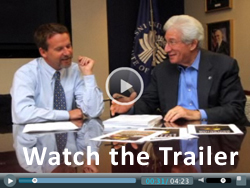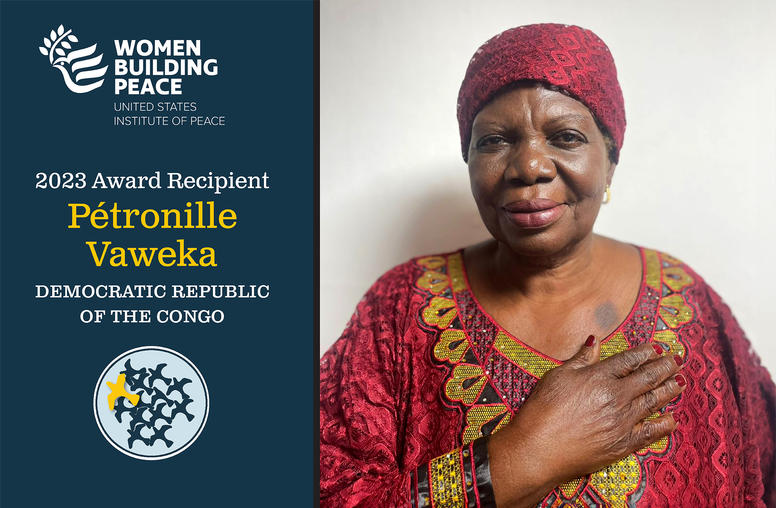USIP Assesses American Negotiating Behavior
At a time when an array of difficult diplomatic challenges require that U.S. diplomats be at the top of their game, a new book by the United States Institute of Peace (USIP Press) comprehensively assesses American negotiating behavior at and away from the bargaining table. "American Negotiating Behavior: Wheeler-Dealers, Legal Eagles, Bullies, and Preachers" by USIP president Richard H. Solomon and co-author Nigel Quinney analyzes the multiple influences -- cultural, institutional, historical, and political -- that shape how American policymakers and diplomats approach negotiations with foreign counterparts.
For Immediate Release, April 2, 2010
(Washington) - At a time when an array of difficult diplomatic challenges requires that U.S. diplomats be at the top of their game, a new book by the United States Institute of Peace (USIP Press) comprehensively assesses American negotiating behavior at and away from the bargaining table.
"American Negotiating Behavior: Wheeler-Dealers, Legal Eagles, Bullies, and Preachers" by USIP President Richard H. Solomon and co-author Nigel Quinney analyzes the multiple influences -- cultural, institutional, historical and political -- that shape how American policymakers and diplomats approach negotiations with foreign counterparts. The book highlights behavioral patterns that transcend the actions of individual negotiators and administrations. Informed by discussions and interviews with more than 50 seasoned foreign and American negotiators, Solomon and Quinney offer a rich, detailed portrait of the negotiating practices of American officials.
In this first study of its kind, Solomon and Quinney examine how American officials employ time, language, enticements and pressure tactics at the negotiating table and how they use (or neglect) the media, back channel communications, and hospitality outside the formal negotiating arena. They explore the intense interagency rivalries and congressional second-guessing that constrain U.S. negotiators’ freedom to maneuver, and they recommend specific measures for enhancing America’s negotiating capacities:
- adapting the training of Foreign Service officers to 21st century requirements;
- improving institutional memory;
- fostering greater interagency collaboration;
- adding to the mix of diplomats more political negotiators -- that is, former elected officials adept at operating in multifaceted, multi-actor environments and skilled in navigating Washington’s complex politics and institutions;
- heightening self-awareness -- looking more introspectively for greater appreciation of how American negotiating practices influence encounters with foreign counterparts.
This volume arrives at a time of great transition for the U.S. in its foreign relations. The international environment has fragmented into a complex mix of state and nonstate entities presenting the U.S. with significant new challenges to its security and foreign policy interests. "If the U.S. is to effectively cope with this dramatically changed environment," says Solomon, "the U.S. will need new policy assumptions or concepts, organization adaptations, and appropriately trained and agile human resources."
 "Emerging realignments in economic and military power and cultural influence will shape America’s ability to respond to changing global circumstances," note the authors, "and will require American diplomacy to shoulder more of the burden of defending and advancing U.S. national interests throughout the world. As such, it is more important than ever for the U.S. to understand its shifting position and role vis-à-vis the rest of the world and to consider whether globalization and the multilateral complexity of the international system would require a reorientation of the American approach to international negotiation."
"Emerging realignments in economic and military power and cultural influence will shape America’s ability to respond to changing global circumstances," note the authors, "and will require American diplomacy to shoulder more of the burden of defending and advancing U.S. national interests throughout the world. As such, it is more important than ever for the U.S. to understand its shifting position and role vis-à-vis the rest of the world and to consider whether globalization and the multilateral complexity of the international system would require a reorientation of the American approach to international negotiation."
"Remarkably, American diplomats, until recently, received virtually no formal training in negotiation from the U.S. State Department. This book is a resource to assist in that process," says Solomon. "For officials from other countries, a better knowledge of U.S. negotiating behavior can help to avoid misunderstanding and misreading of their American counterparts, thereby enhancing prospects for mutually beneficial outcomes."
"The U.S. needs to have its diplomats spend more time in foreign countries, so that they absorb the culture," he adds. "And the U.S. needs to give them much more explicit training in negotiating techniques. Beyond knowing how U.S. institutions work, one of the challenges the United States faces is bringing together the different communities within its own government. Dealing with the well-established tradition of interagency rivalry, the United States must develop more consensual negotiation positions so that the country speaks with one official diplomatic voice."
Just as importantly, the authors contend the United States must understand how the rest of the world perceives its negotiating behavior and diplomatic style. To this end, the volume includes eight remarkably candid foreign perspectives -- the views of ambassadors and foreign ministers, some from countries allied to the United States, others from rivals or adversaries -- on particular aspects of American negotiating behavior.
About the Authors
Richard H. Solomon, president of the United States Institute of Peace, formerly served in the U.S. government on the National Security Staff, directed the State Department’s Policy Planning Staff, and was assistant secretary of state for East Asian and Pacific Affairs and ambassador to the Philippines. He also headed the political science department of the RAND Corporation and was professor of political science at the University of Michigan.
Nigel Quinney, president of The Editorial Group, is a consultant to European and American think tanks, academic institutions, publishers, and multinational corporations. He has more than 20 years’ experience as an editor, writer, and researcher in the fields of international relations and conflict resolution.
Publication Information
"American Negotiating Behavior: Wheeler-Dealers, Legal Eagles, Bullies, and Preachers"
April 2010
United States Institute of Peace Press
200 pp. • 6 x 9
$22.50 (paper) • ISBN: 978-1-601270-47-4
$55.00 (cloth) • ISBN: 978-1-601270-48-1
Contact
|
USIP Press: |
Media Inquiries: |


